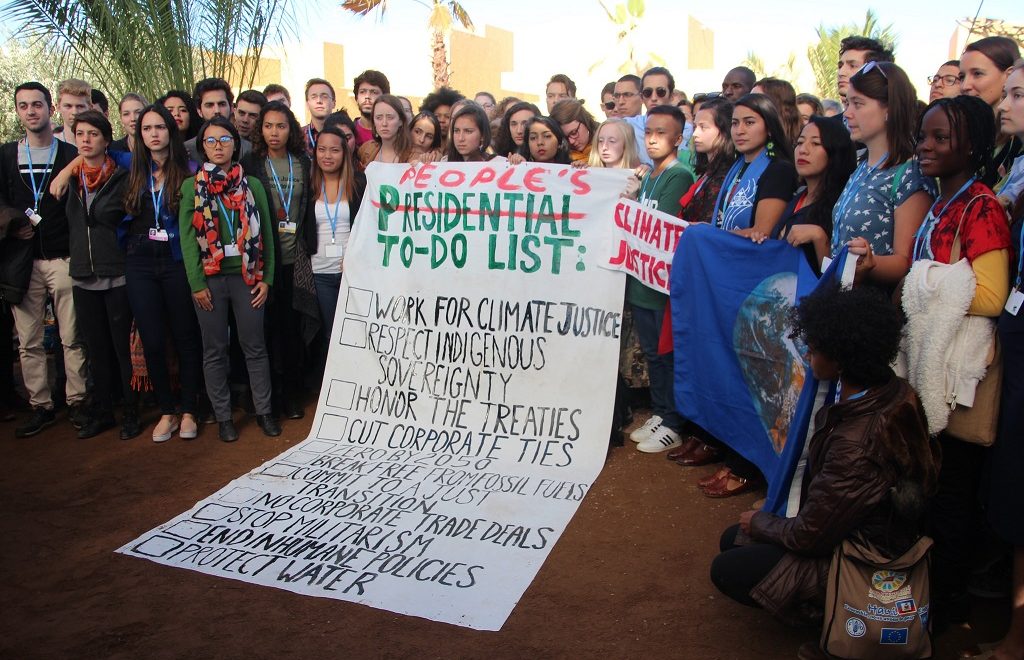Earlier today, after weeks of speculation, President-elect Trump confirmed Rex Tillerson, Chairman and CEO of ExxonMobil, as his choice to be the next Secretary of State.
I have chosen one of the truly great business leaders of the world, Rex Tillerson, Chairman and CEO of ExxonMobil, to be Secretary of State.
— Donald J. Trump (@realDonaldTrump) December 13, 2016
If confirmed by Congress, Tillerson’s appointment poses a triple threat to the global community. Human rights, democracy and democratic institutions, and the future of our planet will all be at risk.
ExxonMobil has had its own share of human rights scandals during Tillerson’s tenure. This trend of taking control of resources such as oil regardless of the human cost is being seen across the extractives sector around the world. Connections between oil production and human rights abuses have been documented in many developing countries, including in Nigeria and other parts of Africa, as well as in Myanmar, Ecuador, and the Middle East.
The recent #NoDAPL protests at Standing Rock also show that the U.S. isn’t immune to this. With such a poor track record already from ExxonMobil, and the oil sector in general, when it comes to human rights, this appointment poses a serious threat to global negotiations and work with our allies.
Do we ally ourselves with human rights defenders or play nice with human rights abusers?
The increasing presence of business leaders within the new administration also poses serious questions about the role that the private sector plays in delivering services to people and supporting their development.
As Secretary of State, Tillerson would also oversee the government’s foreign aid arm USAID, where even more of a shift towards bringing large international companies into development projects raises clear concerns.
When in 1954, the democratically-elected government was toppled by U.S.-backed forces, many of the Eisenhower administration, including then Secretary of State John Foster Dulles, had close ties to the United Fruit Company, now part of Chiquita Brands International. The company was fundamentally opposed to agrarian reform and a new Labor Code being implemented by the Guatemalan government, and it used its connections with the U.S. administration to secure backing for the coup.
Such an example of regime change linked to corporate interests shows how democratically-elected institutions can be undermined when U.S. corporate interests take over. Tillerson’s close business ties are a clear concern.
As the country’s Chief Diplomat, Tillerson and his team will lead the U.S. delegation in the international climate negotiations – a process that his new boss consistently threatened to withdraw from throughout his presidential campaign.
Unlike other appointments to the incoming Trump administration, Tillerson is not said to be a climate change denier. In October, he was quoted as saying that ExxonMobil “share(s) the view that the risks of climate change are real and warrant serious action,” and a month later, the company issued a statement supporting the entering into force of the Paris climate agreement.
At the same time, the company has been accused of being among the first to understand that fossil fuel emissions were heating up the earth’s atmosphere, but actively lobbied to undermine the international agreements that capped emissions.
When the story broke earlier this year, former Vice President Al Gore said:
“We cannot continue to allow the fossil fuel industry to treat our atmosphere like an open sewer or mislead the public about the impact they have on the health of our people and the health of our planet.”
We are at a critical point in the fight against climate change. Farmers in Senegal and The Gambia that ActionAid works with are being forced to adapt to the changing climate, as sea levels rise and the incoming salt water infiltrates the soil, making it impossible to grow food.
The United Nations has warned that up to 50 million people in Southern Africa will need food aid by Christmas, as one of the world’s worst drought crises has gripped the region. And storms and severe weather continue to become stronger and more frequent, with Hurricane Matthew causing devastation in Haiti only a few months ago.
Tillerson told the Council of Foreign Relations in New York in 2012 that climate change is “an engineering problem, and it has engineering solutions.” This only goes to show that he does not get the severity of the climate crisis that we are facing and the urgent action that’s needed to tackle it. This includes cutting emissions and providing money to poor countries who are already struggling to adapt to a crisis that they did not cause.
Under his leadership, ExxonMobil has retained interests in oil projects in the Arctic, and the company is set to make billions of dollars from any easing in sanctions on Russia. Added to this, throughout his ExxonMobil career, he has curried favor with world leaders who have poor records on respect for human rights – something U.S. foreign policy must continue to uphold.
These conflicts of interest, together with his company’s cavalier and deceptive role in lobbying against legislation designed to slow the impacts of climate change, mean that Tillerson is not suited for the office of Secretary of State. That’s why ActionAid will be joining with our partners in the human rights and environmental communities to oppose this nomination and all it represents.


